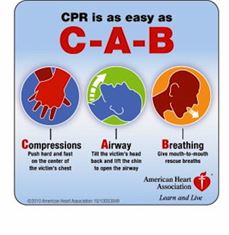Sudden Cardiac Arrest (SCA) an “Electrical” issue
Sudden Cardiac Arrest is the number one cause of out-of-hospital deaths in the United States. The majority of Cardiac Arrest occur at home. Only one-third of Sudden Cardiac Arrest victims receive bystander CPR.
– SCA is associated with an Arrhythmia (abnormal Heart rhythm) referred to as Ventricular Fibrillation – Vent Fib, VF. (Quivering of the heart), causing the heart to go into a chaotic electrical misfiring.
– Sudden cardiac arrest is the abrupt loss of heart function, breathing and consciousness. The condition results from an electrical disturbance in the heart that disrupts its pumping action, stopping blood flow to the heart and brain.
Sudden cardiac arrest differs from a heart attack; however, a heart attack can trigger an electrical disturbance that leads to SCA.
Sudden cardiac arrest signs and symptoms are immediate and drastic and include:
– Sudden collapse
– No pulse
– No breathing
– Loss of consciousness
Sometimes other signs and symptoms occur before sudden cardiac arrest. These might include:
– Chest discomfort
– Shortness of breath
– Weakness
– Palpitations (noticeably rapid, strong, or irregular heartbeat due to agitation, exertion, or illness).
But sudden cardiac arrest often occurs with NO Warning!
– ONLY 6-10% of all out hospital Sudden Cardiac Arrest victims survive.
Major causes of Sudden Cardiac Arrest:
– Previous Heart Attacks are the leading cause of Sudden Cardiac Arrest.
– Recreational drug use. Use of certain recreational drugs can cause sudden cardiac arrest, even in otherwise healthy people.
A Heart Attack can trigger an electrical disturbance that leads to SCA. Previous Heart Attacks weaken the heart by destroying a portion of the Heart muscle, forming scar tissue leaving the heart vulnerable to subsequent Heart Attacks and possible Sudden Cardiac Arrest.
– Coronary Artery disease – When arteries become clogged (Atherosclerosis) with fatty deposits, reducing and restricting blood flow and oxygen to the heart.
– Enlarged Heart (Cardiomyopathy). A condition that leads to various arrhythmias (Abnormal Heart rhythm)
– Congenital Heart disease. Due to a heart defect present at birth.
– Tachycardia, in general, a resting heart rate over 100 beats per minute (sustained) is accepted as tachycardia in adults.
– Bradycardia, is a condition wherein an individual has a resting heart rate of under 60 (BPM sustained) in adults.

